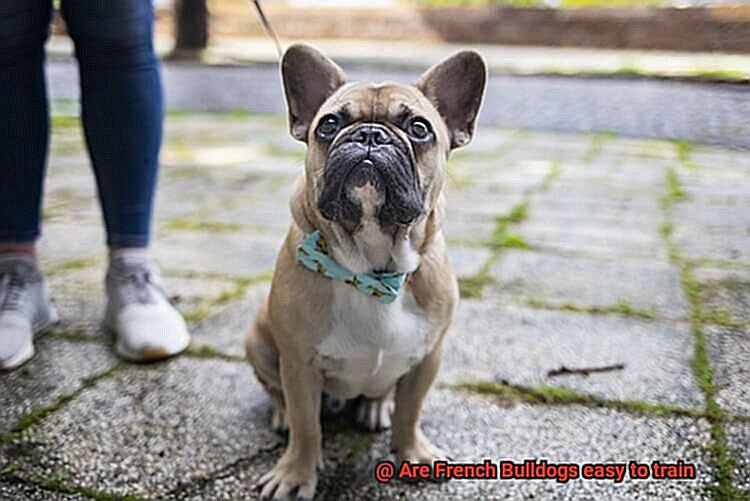Are French Bulldogs easy to train?
Welcome to our blog post all about French Bulldogs and their trainability.
If you’re thinking about getting one of these adorable bat-eared bundles of joy, you’re probably wondering just how easy they are to train. Well, don’t worry because we’ve got the inside scoop for you.
French Bulldogs are small, cute, and have eyes that could melt even the coldest heart. They’re super popular, but some people say they can be a bit stubborn.
So, the big question is: are French Bulldogs easy to train? In this guide, we’re going to dig deep into the world of training these little guys.
So grab a cup of joe, snuggle up with your furry friend, and let’s get started.
Understanding the Temperament of French Bulldogs
Contents
- 1 Understanding the Temperament of French Bulldogs
- 2 The Benefits of Positive Reinforcement Training for French Bulldogs
- 3 Consistency and Patience in Training a French Bulldog
- 4 Socialization and its Role in Training French Bulldogs
- 5 Dealing with Stubbornness When Training a French Bulldog
- 6 Breaking Down Training into Small Steps
- 7 The Importance of Regular Practice and Repetition
- 8 Tips for Successful Training of a French Bulldog
- 9 Conclusion
French Bulldogs are beloved for their friendly and affectionate nature. While they are generally considered to be an easygoing breed, their trainability can be influenced by factors such as individual personality, consistency in training methods, and early socialization experiences. As an expert on this topic, I will provide you with valuable insights to help you train your French Bulldog effectively and create a strong bond with your furry friend.
Individual Personality:
Every French Bulldog is unique, and their temperament can vary. Some may be more stubborn or independent than others, which can present challenges during training. Recognizing and working with your dog’s personality traits is essential to tailor your training approach accordingly. Stay patient, understanding, and positive throughout the process.
Consistency in Training Methods:
French Bulldogs respond best to positive reinforcement techniques. Use treats, praise, and playtime as rewards for desired behaviors. Consistency is key – establish a clear set of commands and stick to them. Avoid harsh or punitive methods, as they can cause anxiety or resistance in these sensitive dogs.
Early Socialization Experiences:
Socialization is crucial for French Bulldogs to develop good manners and adaptability. Expose them to different environments, people, animals, and experiences from an early age. This helps them become well-rounded dogs who are comfortable in various situations.
Short, Engaging Training Sessions:
French Bulldogs have a tendency to become easily bored or distracted during training. Keep sessions short (around 10-15 minutes) and make them engaging and varied. Break down commands into small steps and gradually build upon them to prevent frustration for both you and your dog.
Patience and Positive Attitude:

Training a French Bulldog requires patience, understanding, and a positive attitude. These dogs thrive on positive attention and encouragement. Celebrate small victories along the way and remember that training is a journey, not a destination.
The Benefits of Positive Reinforcement Training for French Bulldogs
When it comes to training our beloved French Bulldogs, we want to use methods that are not only effective but also build a strong bond between us and our furry companions. That’s where positive reinforcement training comes in. This highly recommended method focuses on rewarding desired behaviors rather than punishing unwanted ones, creating a positive learning environment for our Frenchies. Let’s dive into the benefits of positive reinforcement training and how it can help unlock the potential of our French Bulldogs.
Builds Trust and Bonding
French Bulldogs are sensitive souls who thrive on love and attention. Positive reinforcement training allows us to establish trust with our Frenchies by showering them with rewards such as treats, praise, and toys when they exhibit desired behaviors. This fosters a strong bond between us and our furry friends, making them eager to please us and more likely to engage in future training sessions.

Faster Learning and Willingness to Obey

French Bulldogs are intelligent dogs who love to learn new things. With positive reinforcement training, we can tap into their natural curiosity and desire to please us. By rewarding them for performing commands or tricks correctly, we can motivate them to learn quickly and willingly. It’s like teaching a dog new tricks while making it feel like a game.
Prevents Behavioral Issues
One of the key advantages of positive reinforcement training is its ability to prevent behavioral issues in French Bulldogs. By focusing on rewarding desired behaviors instead of punishing unwanted ones, we create an environment that encourages good behavior from our furry friends. This helps prevent common issues such as aggression, anxiety, and fearfulness, leading to a happier and well-adjusted Frenchie.
Encourages Problem-Solving Abilities
Positive reinforcement training encourages our French Bulldogs to think and problem-solve. Rather than relying on force or intimidation, this method prompts our furry friends to use their brains and find the right way to earn those rewards. This not only improves their overall behavior and obedience but also stimulates their mental abilities, keeping them active and engaged.
Stress-Free Learning
French Bulldogs are sensitive to stress and can easily become overwhelmed during training sessions. Positive reinforcement training allows them to learn at their own pace, without feeling pressured or stressed. By creating a positive and enjoyable training experience, we can help our Frenchies feel more relaxed and eager to participate in future training sessions.
Long-Lasting Effects
Positive reinforcement training has long-lasting effects on our French Bulldogs’ behavior. By consistently rewarding desired behaviors, we help them understand what is expected of them in various situations. This makes it easier for them to retain what they have learned, leading to better overall obedience and behavior.
Consistency and Patience in Training a French Bulldog
French Bulldogs thrive on routine and structure, so it’s crucial to establish consistent rules and expectations right from the beginning. This means using the same commands, gestures, and rewards consistently throughout the training process. By doing so, your French Bulldog will quickly understand what is expected of them and be more likely to respond appropriately. Consistency also helps to avoid confusion and prevents your dog from becoming frustrated or anxious.
Patience is a Virtue: Positive Reinforcement Techniques
French Bulldogs can be sensitive and easily discouraged by harsh or impatient training methods. Instead, opt for positive reinforcement techniques that reward good behavior rather than punishing bad behavior. This can include treats, praise, or playtime as a reward for following commands correctly. By using positive reinforcement, you are not only motivating your French Bulldog to learn but also building trust and strengthening the bond between you.
Understanding the Unique Nature of French Bulldogs
French Bulldogs have an independent nature, which means they may need extra time to fully understand and execute commands. It’s important not to get frustrated or give up if progress seems slow. Consistently working with your French Bulldog and providing them with positive reinforcement will eventually lead to success. Remember that every dog is unique, and some French Bulldogs may require more time and effort than others.
Short and Engaging Training Sessions
French Bulldogs have a relatively short attention span, so long training sessions can lead to boredom and disinterest. Aim for multiple short sessions throughout the day rather than one long session. Make sure each session is filled with fun and interactive activities that keep your French Bulldog excited and engaged. This could include playing games, using toys during training, or incorporating physical exercise into the sessions.
Socialization and its Role in Training French Bulldogs

When it comes to training French Bulldogs, socialization is a key component that should not be overlooked. This process involves exposing your furry friend to a variety of people, animals, environments, and experiences from a young age. Socialization helps them develop appropriate behaviors and reactions, ensuring they grow up to be well-rounded and well-behaved dogs. Let’s take a closer look at the role of socialization in training French Bulldogs.
Building confidence and reducing anxiety
French Bulldogs can be prone to anxiety and fear if not properly socialized. By introducing them to different situations, people, and animals early on, you help them become more confident and adaptable. Start with less overwhelming environments, such as quiet parks or familiar homes, and gradually expose them to busier streets or crowded places. This gradual exposure will prevent overwhelming your furry friend and build their confidence over time.
Teaching proper interaction skills
Socialization also plays a crucial role in teaching French Bulldogs how to interact appropriately with others. By exposing them to various people, including strangers, children, and other pets, you help them develop good manners and learn how to behave in different social situations. Positive reinforcement training methods should always be used during socialization to ensure a positive association with new experiences and individuals.
Preventing separation anxiety
French Bulldogs can be prone to separation anxiety if not properly trained and socialized. They form strong bonds with their owners and may become anxious when left alone. By gradually exposing them to periods of alone time from an early age, teaching them that being alone is okay, and providing activities to keep them occupied, you can help prevent separation anxiety.
Puppy classes and obedience training
Enrolling your French Bulldog in puppy classes or obedience training programs can greatly aid in their socialization journey. These classes provide opportunities for your furry friend to interact with other dogs and people in a controlled environment. They also help teach basic commands and build a strong foundation for further training.
Socialization should not end after puppyhood but continue throughout your French Bulldog’s life. Regular outings, playdates with other dogs, and interactions with new people will help keep their social skills sharp and prevent regression. Remember, consistency and repetition are key to maintaining their socialization progress.
Dealing with Stubbornness When Training a French Bulldog
Training a French Bulldog can be a rewarding experience, but it can also be frustrating at times due to their stubborn nature. However, with the right approach and techniques, you can overcome this stubbornness and have a well-trained and obedient Frenchie. Here are some tips to help you deal with stubbornness when training your French Bulldog:
- Be Patient and Consistent: French Bulldogs are known for their independent streak, so it’s important to be patient and consistent during training sessions. Don’t get frustrated easily and give up, as this will only make the training process more difficult.
- Use Positive Reinforcement: French Bulldogs respond well to positive reinforcement, so use treats or toys as rewards for good behavior. Be generous with rewards and provide them immediately after the desired behavior is exhibited. This will help reinforce the connection between the behavior and the reward.
- Break Down the Training: Instead of overwhelming your Frenchie with multiple commands at once, focus on one command at a time. Start with basic commands like sit or stay, and gradually move on to more complex commands. Breaking down the training process into small steps makes it easier for your Frenchie to understand and learn.
- Stay Consistent: Consistency is key when dealing with stubbornness in French Bulldogs. Use the same commands and cues consistently throughout the training process to minimize confusion. Also, be consistent with the timing of rewards and corrections, providing them immediately after the behavior occurs.
- Use Positive Reinforcement Techniques: Clicker training or marker training can be effective when dealing with stubbornness in French Bulldogs. These techniques involve using a distinctive sound or signal to mark the desired behavior, followed by a reward. This helps your Frenchie understand exactly what behavior is being rewarded.
Breaking Down Training into Small Steps
French Bulldogs are notorious for their stubbornness and independent nature, which can make training them a challenge. However, with the right approach and a little patience, you can unlock their potential and successfully train your Frenchie. One effective technique is breaking down the training process into small, manageable steps. Let’s explore why this approach is crucial and how it can benefit both you and your furry friend.
Start with the Basics:
When training a French Bulldog, it’s essential to start with basic commands such as sit, stay, and come. These foundational commands lay the groundwork for more advanced training in the future. By focusing on one command at a time, you can help your Frenchie understand what is expected of them and build their confidence.
Positive Reinforcement:
Positive reinforcement is a powerful tool when training any dog, including French Bulldogs. By using treats, praise, and rewards, you can motivate your Frenchie to follow commands and reinforce good behavior. Make sure to use high-value treats that your dog finds irresistible to keep them engaged and eager to learn.
Consistency is Key:
Consistency is vital when breaking down training into small steps. It’s important to practice these commands regularly and in various settings to reinforce the behavior. For example, if you’re teaching your Frenchie to sit, practice this command inside the house, in the backyard, or during walks. This will help them generalize the behavior and understand that the command applies in different situations.
Gradually Increase Difficulty:
Once your Frenchie has mastered the basic commands, it’s time to gradually increase the difficulty level. For example, once they have learned to sit on command, you can move on to teaching them to lie down or shake hands. By gradually building on their existing skills, you are challenging your Frenchie while setting them up for success.
Patience and Understanding:
Training a French Bulldog takes time, patience, and understanding. They may take longer to learn certain commands compared to other breeds, but with consistent training and a positive attitude, they will eventually get there. Remember to celebrate small victories and never get discouraged.
The Importance of Regular Practice and Repetition
In this post, we will explore the importance of regular practice and repetition in training your beloved Frenchie. Get ready to discover how consistency, positive reinforcement, and a dash of patience can transform your pup into a well-behaved and obedient companion.
The Science Behind Regular Practice and Repetition
- Muscle Memory: Learn how repetition helps your Frenchie develop muscle memory, making it easier for them to recall commands and behaviors.
- Retention: Understand why regular practice reinforces training lessons and ensures that your furry friend retains the information for a longer period.
Training Tips for Consistency and Success
- Establishing a Routine: Discover why scheduling training sessions at the same time each day is crucial for your Frenchie’s learning process.
- Short and Frequent Sessions: Learn the benefits of keeping training sessions brief and focused on one command or behavior at a time.
- Positive Reinforcement: Explore the power of treats, praise, and play in motivating your Frenchie to continue learning and obeying commands.
Overcoming Challenges with Consistency
- Dealing with Stubbornness: Gain insights into how regular practice and repetition can help overcome your Frenchie’s stubbornness during training.
- Avoiding Mixed Signals: Understand why consistent cues and signals are vital to prevent confusion and hinder progress.
Expanding Training Horizons
- Beyond Basic Commands: Discover the importance of continually challenging your Frenchie with new commands, tricks, or behaviors to keep their minds stimulated.
- Strengthening the Bond: Learn how regular practice and repetition during training sessions can reinforce the bond between you and your Frenchie.
Tips for Successful Training of a French Bulldog
Training a French Bulldog can be a rewarding and fulfilling experience, but it requires patience, consistency, and a positive mindset. As an expert on this topic, I understand the challenges that come with training these adorable yet stubborn dogs. In this blog post, we will explore tips and insights that will help you successfully train your French Bulldog and build a strong bond with them.
Start Early:
Training your French Bulldog from a young age is crucial. Puppies have a natural curiosity and eagerness to learn, making them more receptive to training. Take advantage of this stage to set the foundation for good behavior and obedience as they grow older.
Positive Reinforcement:
French Bulldogs respond well to positive reinforcement techniques. Rewarding good behavior with treats, praise, or their favorite toy will motivate them to continue behaving appropriately. Avoid punishment or harsh corrections, as it can lead to fear or aggression in these sensitive dogs.
Consistency is Key:
Consistency is vital when training any dog, including French Bulldogs. Establish consistent rules and routines, ensuring that all family members are on the same page. This will prevent confusion and help your Frenchie understand what is expected of them.
Short and Engaging Training Sessions:
French Bulldogs have a relatively short attention span, so keeping training sessions short and focused is essential. Aim for 10-15 minute sessions a few times a day, rather than one long session. This will keep your Frenchie engaged and prevent them from becoming bored or frustrated.
Simple Commands:
While French Bulldogs may not excel at advanced obedience tasks, they can learn basic commands such as sit, stay, come, and down. Stick to simple and clear commands, using consistent hand signals or verbal cues. Repetition and patience are key when teaching these commands.
Socialize Your Frenchie:
Exposing your French Bulldog to various people, animals, and environments from an early age is crucial for their social development. This will help them become well-rounded and confident dogs. Consider enrolling them in puppy classes or arranging playdates with other friendly dogs to encourage positive social interactions.
Conclusion
In conclusion, it can be said that French Bulldogs are generally easy to train.
Their intelligence and eagerness to please make them quick learners. However, it is important to remember that each dog is unique and may have their own individual quirks and challenges when it comes to training.
With the right approach and dedication, you can successfully train your French Bulldog to be well-behaved and obedient.




